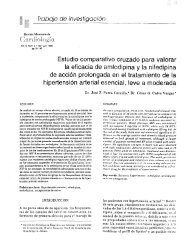Desigualdad Social y Equidad en Salud: Perspectivas Internacionales
Desigualdad Social y Equidad en Salud: Perspectivas Internacionales
Desigualdad Social y Equidad en Salud: Perspectivas Internacionales
- No tags were found...
You also want an ePaper? Increase the reach of your titles
YUMPU automatically turns print PDFs into web optimized ePapers that Google loves.
of public resources—for both the social security system and the dec<strong>en</strong>tralized statesystems. In addition, the reforms of 1996, due to the logic of compet<strong>en</strong>ce, couldaffect poor areas and the more financial capacity of rich states will allow them tointroduce more services. (Laurell 2001)In g<strong>en</strong>eral, in only a minority of the countries in LAC where the reforms havebe<strong>en</strong> implem<strong>en</strong>ted, is there evid<strong>en</strong>ce of a decrease of inequities in resources allocationbetwe<strong>en</strong> geographical areas (Infante, de la Mata et al. 2000).In addition to this inconsist<strong>en</strong>cy in geographical equity of allocation, equity ofresource allocation betwe<strong>en</strong> differ<strong>en</strong>t levels of att<strong>en</strong>tion has be<strong>en</strong> more consist<strong>en</strong>tlyreported. In Colombia, for example, there was a redistribution of financial resourceswith an increased participation of first level services (Jaramillo 2002). In Chile, thefunding for primary att<strong>en</strong>tion is also guaranteed, ev<strong>en</strong> though other types of serviceshave more inequity. (Guimarâes 2001)Discussion and ConclusionThe dec<strong>en</strong>tralization defined as the transfer<strong>en</strong>ce of power and compet<strong>en</strong>ces from thec<strong>en</strong>tral governm<strong>en</strong>t to peripheral levels of governm<strong>en</strong>t has implied a great variety ofprocesses in the differ<strong>en</strong>t countries of the region. The process of dec<strong>en</strong>tralization incountries such as Colombia, Brazil, Chile, Mexico and Costa Rica illustrated differ<strong>en</strong>tt<strong>en</strong>d<strong>en</strong>cies in the transformations of the health systems in the region. Althoughthese t<strong>en</strong>d<strong>en</strong>cies are contradictory, this seems to indicate that dec<strong>en</strong>tralization is notthe magic solution to the problems in equity of health systems as is promoted bysome international institutions.In Colombia, there are some positive effects in equity that have be<strong>en</strong> described,however, they are not clear and must be placed into perspective. Initially, althougha positive effect is described by some authors in terms of equity of access betwe<strong>en</strong>differ<strong>en</strong>t income groups and geographical areas, others agree in the fact that severalbarriers are maintained and ev<strong>en</strong> created within the system. Some of the m<strong>en</strong>tionedbarriers are the lack of universal coverage, the exist<strong>en</strong>ce of two regimes of affiliation,the limitations of the packages of health services and adopted mechanism asco-paym<strong>en</strong>ts.In addition, as the possible increm<strong>en</strong>t described is closely related with the increasedcoverage of affiliation and the creation of the subsidized sector there aresome aspects that must be tak<strong>en</strong> into consideration. Importantly, the old systemdiffered in terms of the role of the insurance, as the most of the population did notneed to be assured to have access to the services provided by the Ministry of Health.This means that real equity should be based on the comparison of access to services,which is not clear to have increased in Colombia.The clearer effect in allocation of resources and geographical equity in Colombia20 Dec<strong>en</strong>tralization And Equity
















